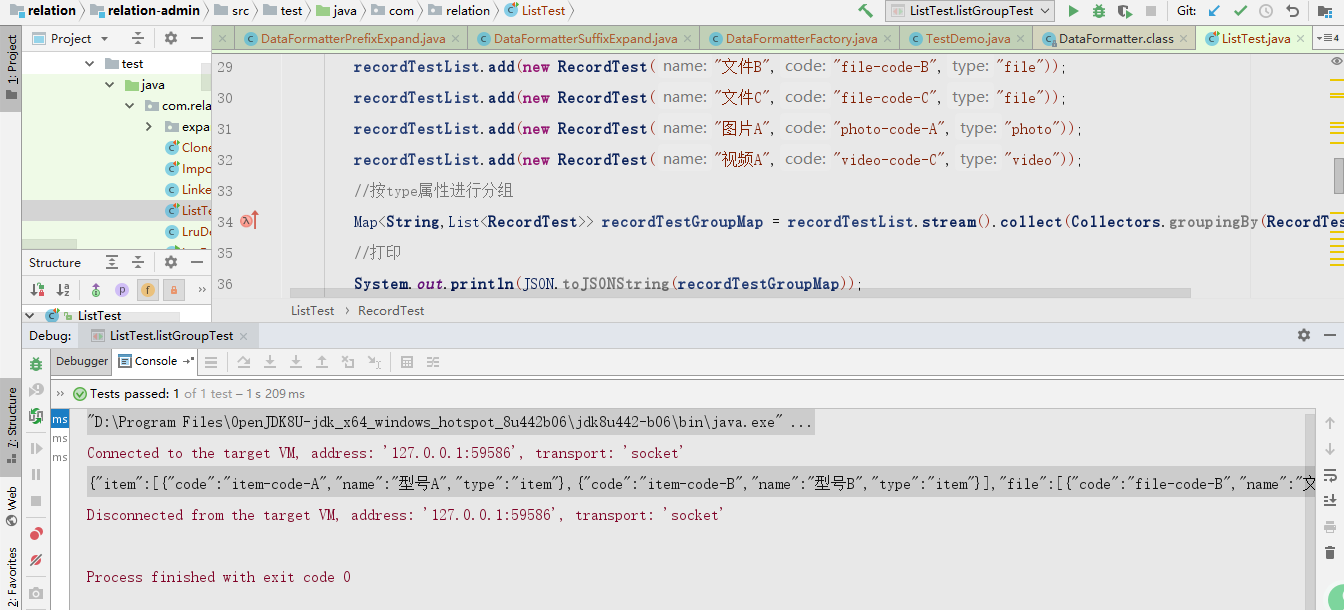一、前言
最近小永哥发现,在开发过程中,经常会遇到需要对list进行分组,就是假如有一个RecordTest对象集合,RecordTest对象都有一个type的属性,需要将这个集合按type属性进行分组,转换为一个以type为key,RecordTest集合为value的Map对象,这个功能其实本身并不难,相信以老铁们的实力那还不是轻轻松松嘛,那下面小永哥就先献丑了。
二、代码实现
2.1、常规实现
实现思路:通过创建一个Map,然后遍历原RecordTest集合,在循环中先获取到type属性,然后判断该type属性在Map中是否存在,如果以存在,就从Map中通过key获取到一个list,然后将当前本次循环所操作的RecordTest对象add到这个list中。如果该type在Map中不存在,那么就新建一个list,将本次循环的RecordTest对象add进去,然后再以type为key,list为value的方式put进Map中,最后我们就获取到了一个以type分好组的Map对象了。
java
package com.relation;
import cn.hutool.core.collection.CollectionUtil;
import cn.hutool.core.map.MapUtil;
import com.alibaba.fastjson2.JSON;
import org.junit.jupiter.api.Test;
import java.util.List;
import java.util.Map;
/**
* @author huhy
* @version 1.0
* @Description:
* @ClassName Date:2025/5/20 21:50
*/
public class ListTest {
@Test
public void listGroupTest(){
//模拟数据准备
List<RecordTest> recordTestList = CollectionUtil.newArrayList();
recordTestList.add(new RecordTest("型号A","item-code-A","item"));
recordTestList.add(new RecordTest("型号B","item-code-B","item"));
recordTestList.add(new RecordTest("文件A","file-code-B","file"));
recordTestList.add(new RecordTest("文件B","file-code-B","file"));
recordTestList.add(new RecordTest("文件C","file-code-C","file"));
recordTestList.add(new RecordTest("图片A","photo-code-A","photo"));
recordTestList.add(new RecordTest("视频A","video-code-C","video"));
//按type属性进行分组
Map<String,List<RecordTest>> recordTestGroupMap = MapUtil.newHashMap();
for (RecordTest recordTest : recordTestList) {
String type = recordTest.getType();
List<RecordTest> recordTests;
if(recordTestGroupMap.containsKey(type)){
recordTests = recordTestGroupMap.get(type);
}else {
recordTests = CollectionUtil.newArrayList();
recordTestGroupMap.put(type,recordTests);
}
recordTests.add(recordTest);
}
//打印
System.out.println(JSON.toJSONString(recordTestGroupMap));
}
class RecordTest{
private String name;
private String code;
private String type;
public RecordTest(String name, String code, String type) {
this.name = name;
this.code = code;
this.type = type;
}
public String getName() {
return name;
}
public void setName(String name) {
this.name = name;
}
public String getCode() {
return code;
}
public void setCode(String code) {
this.code = code;
}
public String getType() {
return type;
}
public void setType(String type) {
this.type = type;
}
}
}
打印出的信息不太方便观看,我们找个工具将JSON格式化一下,顺便提一句,有时候我们需要将JSON文本格式化的时候,是不是冷不丁还想不到什么好的方式,特别是开发环境还是内网的时候,没办法上网在线转?其实不管是内网还是外网开发环境,我们作为一个后端开发人员,postman可以说是标配,毕竟还得自测接口嘛,这时候postman就能发挥作用了,postman的post请求在输入参数以后,有一个Beautify的按钮,轻轻一点,JSON文本就格式化好了,非常方便。

这点小玩意儿虽然顺利实现了,而且实现代码也不孬,但是距离优雅还是差不少,下面我们换种嗨皮的实现方式。
2.2、优雅实现
java
@Test
public void listGroupTest(){
//模拟数据准备
List<RecordTest> recordTestList = CollectionUtil.newArrayList();
recordTestList.add(new RecordTest("型号A","item-code-A","item"));
recordTestList.add(new RecordTest("型号B","item-code-B","item"));
recordTestList.add(new RecordTest("文件A","file-code-B","file"));
recordTestList.add(new RecordTest("文件B","file-code-B","file"));
recordTestList.add(new RecordTest("文件C","file-code-C","file"));
recordTestList.add(new RecordTest("图片A","photo-code-A","photo"));
recordTestList.add(new RecordTest("视频A","video-code-C","video"));
//按type属性进行分组
Map<String,List<RecordTest>> recordTestGroupMap = recordTestList.stream().collect(Collectors.groupingBy(RecordTest::getType));
//打印
System.out.println(JSON.toJSONString(recordTestGroupMap));
}

三、结语
通过jdk1.8特性一行实现分组功能,代码量瞬间减少了10行,虽然现在节省的10行不算什么,但是积少成多,等真正开发的时候,我们可以把学到的东西都尽可能的付诸于实践,这样节省的就不仅仅是10行,可能就是成千上万行,我们的代码也会越来越精炼。